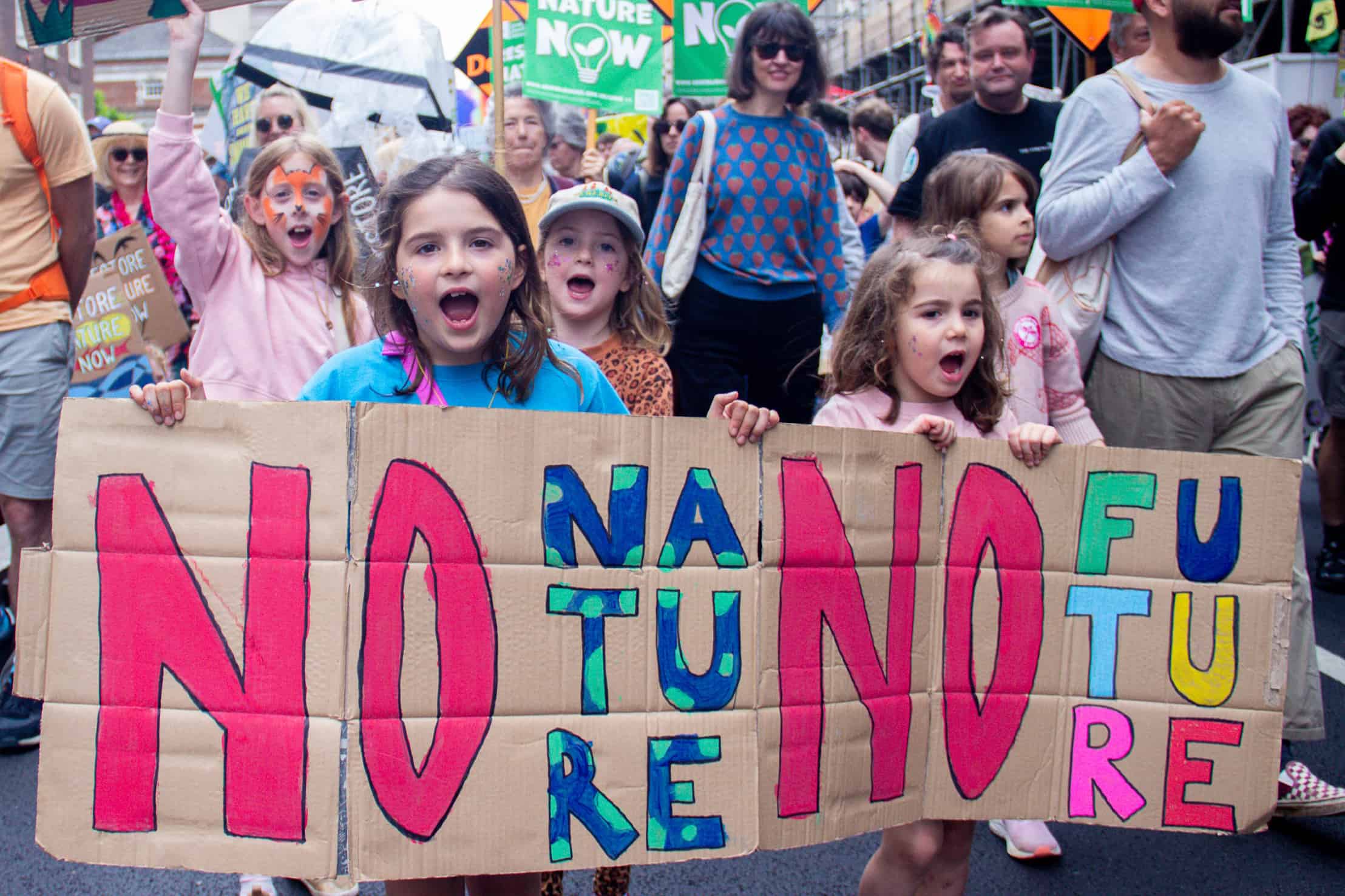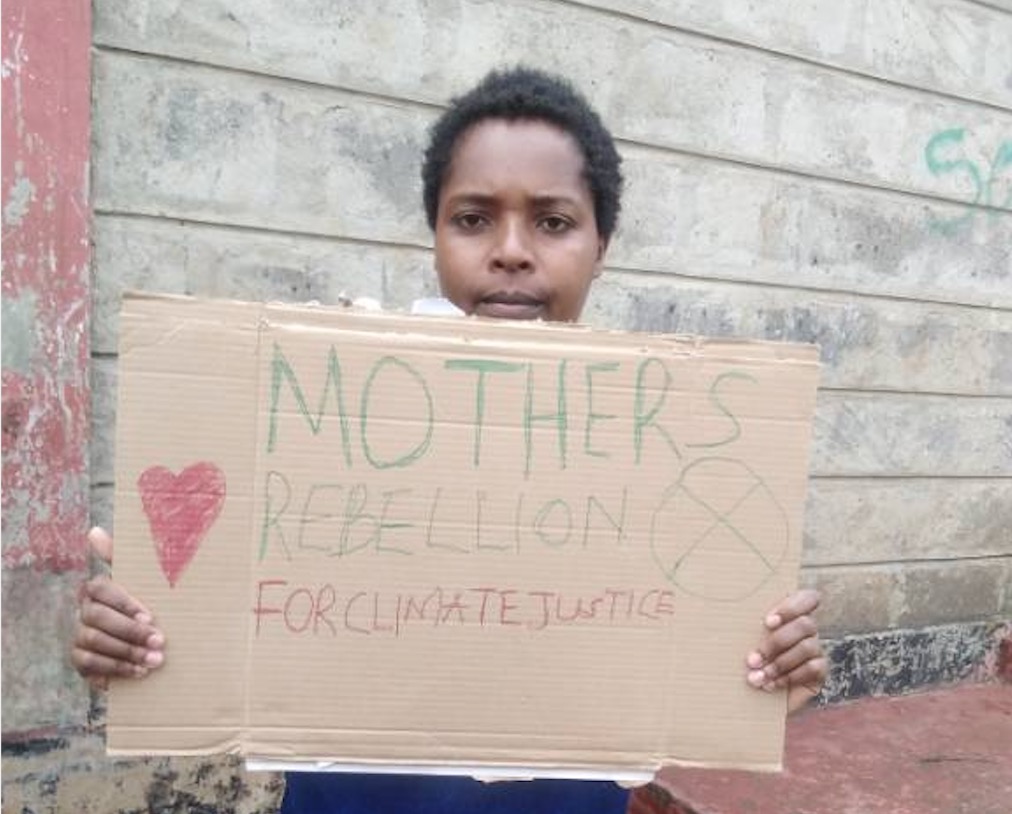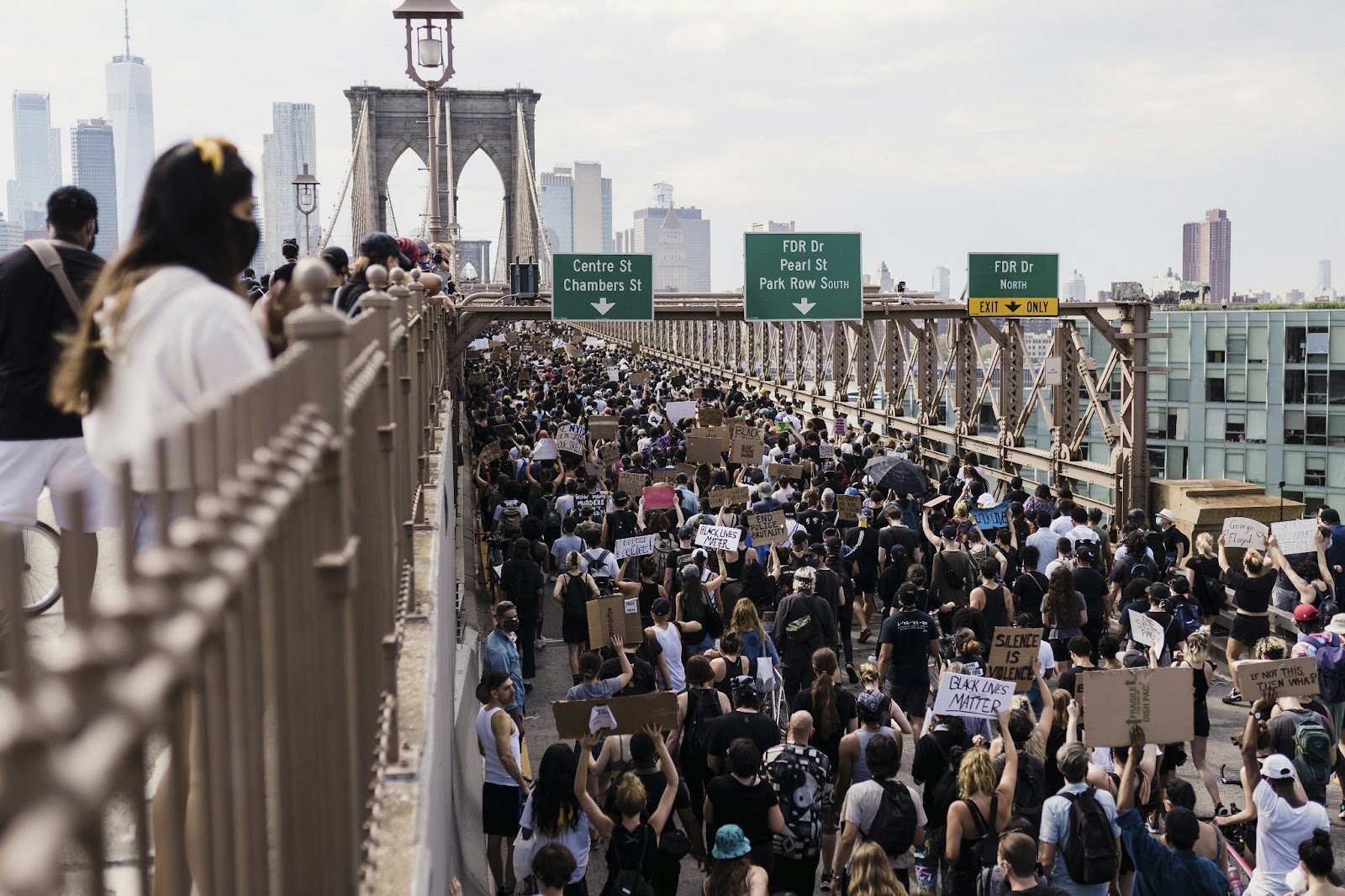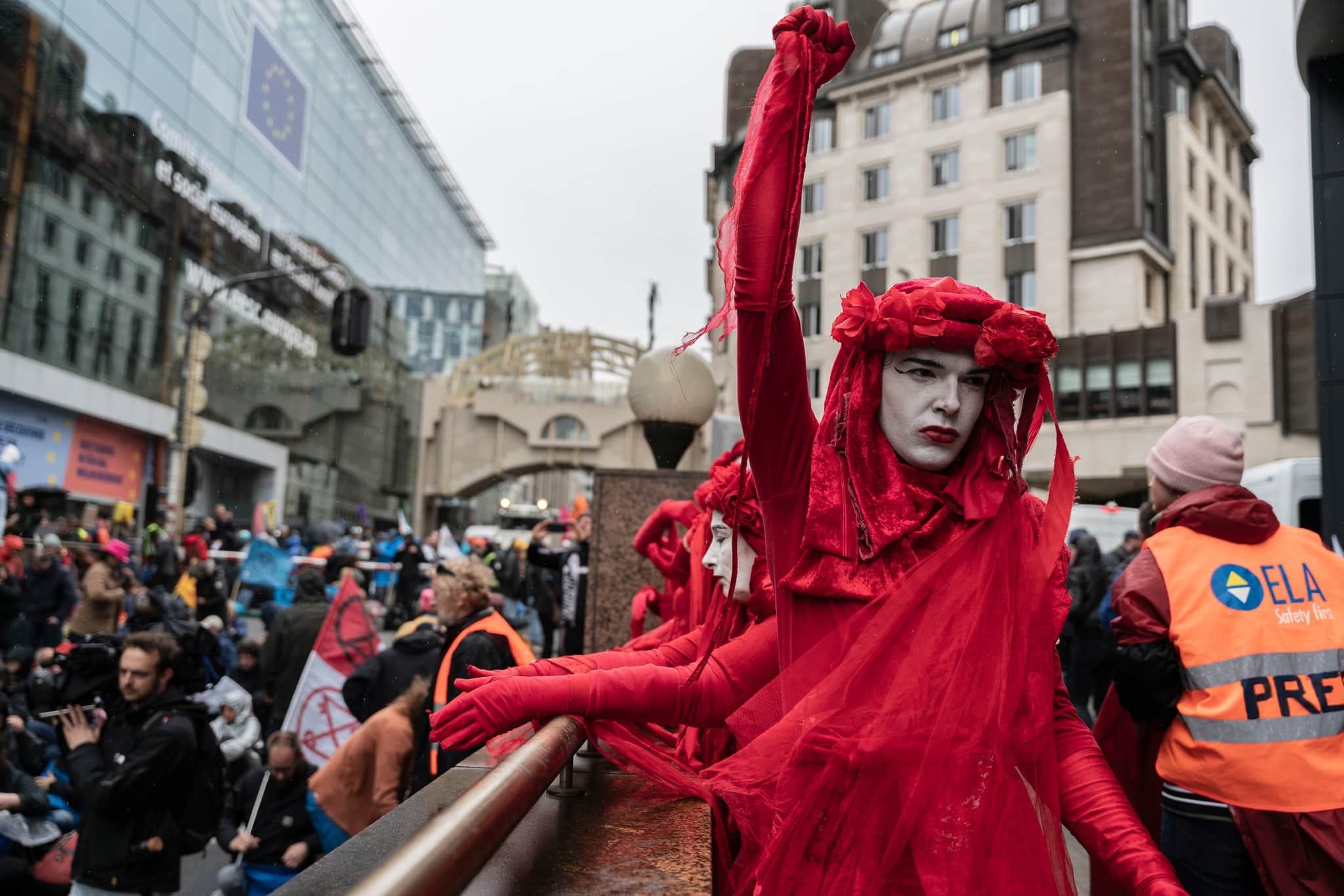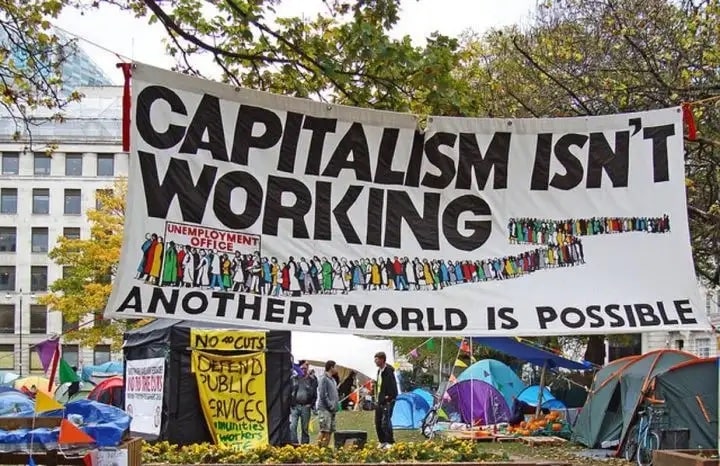
A banner on the site of Occupy London in 2011. Photo: Judy Greenway
In this issue: Degrowth | Lützerath vs Coal Mine | Finland’s Forest Blockades |
Dear rebel,
At the start of each year, the world’s corporate and political elites fly to Davos, a ski resort in the Swiss Alps, to discuss issues affecting the global economy.
Whether covering the war in Ukraine, or Covid’s resurgence in China, the goal of each World Economic Forum session is always the same - ensure economic growth. That’s because the system that runs our global economy needs economic growth to survive.
Under capitalism, economic growth must be exponential and eternal, and that has driven an ever-increasing plunder of the planet’s resources to produce profit. Now nature is unravelling, and the pollution of that plunder is altering our atmosphere. The demands of capitalism have directly led to the climate and ecological crisis.
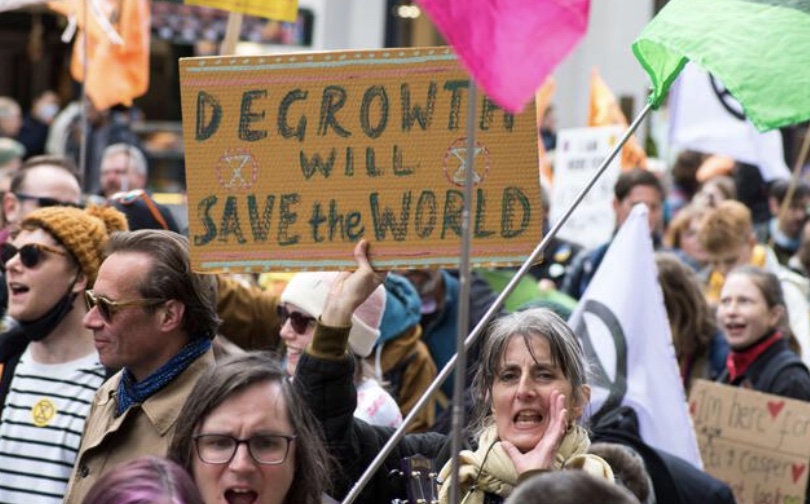
It just might you know. Photo: Stuart Walden
Despite being most culpable for this crisis, the delegates at Davos will not countenance capitalism being replaced. Instead, they offer bogus theories (green growth!) overblown technology (carbon capture!) delusional schemes (space extractivism!) and horrifying fixes (geo-engineering!). Anything to preserve the privilege capitalism has brought them.
One successor to capitalism that’s gaining mainstream attention is degrowth. Degrowth puts human need over mindless consumerism, public services before private wealth accumulation, and sustainability above a small coterie of billionaires.
You can learn the basics in our Degrowth Q&A, go deeper with our Degrowth Must-Reads, and hear from a market-trader-turned-rebel in India who’s part of the degrowth movement in Degrowthers of XR.

Finnish rebels trek across Lapland to stop the state from felling an old-growth forest.
In Action Highlights we also report on the amazing occupation of Lützerath, where a broad activist alliance tried to stop a German village from being swallowed up by a coal mine; the rebel blockades deep in the snow-coated forests of Finland; and the chilling pre-arrests of Dutch rebels days before a peaceful road blockade.
Whatever the rich and powerful in Davos might want, and whatever their media outlets might say, more economic growth is not a cure, it is a cancer, driven by the ecocidal logic of capitalism. Sustainable alternatives like degrowth are ready and waiting.
People know what we’re against. It’s time to tell them what we’re for.
The XR Global Newsletter is brought to you by XR Global Support, a worldwide network of rebels who help our movement grow. We need money to continue this crucial work.
Contents
- Action Highlights: Occupy Lützerath, Finnish Forest Blockade, Dutch Pre-Arrests
- Action Roundup: Switzerland, France, Australia, Rwanda, Uganda, Argentina
- Special Report: Degrowth Q&A
- Degrowth Must-Reads: Less Is More, Al Jazeera, Kothari & Bajpai, Parrique
- Degrowthers of XR: Ishan, XR India
- Book of the Month: All We Can Save: Truth, Courage & Solutions
- Upcoming Actions: XR UK’s The Big One, Debt 4 Climate
- Announcements: Burn Out Workshop, Solarpunk Showcase, XR Disabled Zine
Action Highlights
The Village Eaten By A Coal Mine
11 - 17 JAN | Lützerath, Germany
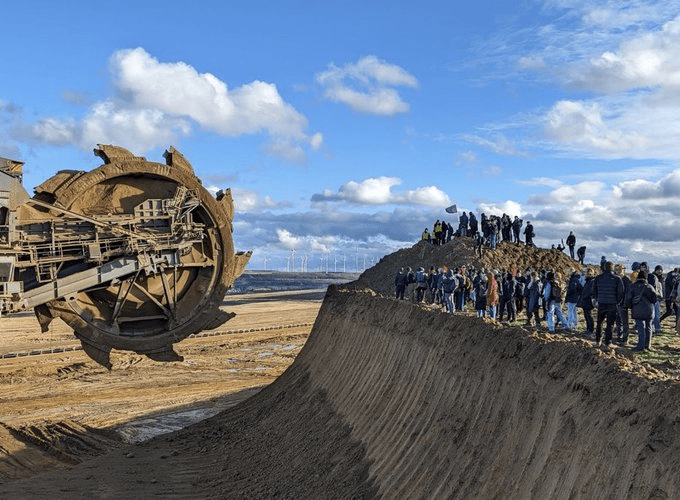
Protesters reach the edge of the open pit mine that will ultimately swallow the village.
Lützerath was once a small village in Western Germany. By now it’s been levelled to the ground, the result of a dirty deal struck between Germany’s government and its biggest energy company, RWE.
In exchange for pledging to quit coal by 2030, the company was allowed to expand an open-pit coal mine that neighboured the village, and extract 280 million tons of coal lying beneath it. While the Green Party politicians behind the deal believed it an acceptable compromise, many green activists chose to disagree.
Under the banner “Lützerath Unräumbar” (Lützerath Unmoveable), a vast alliance of rebels, other ecoactivists, anti-fascists, pensioners, church groups and more, descended on the village to halt the destruction. The state and RWE dispatched police and private security to clear them out. It took them over a week.

Activists with Ende Gelände block a railway taking the coal to an RWE power station.
Activists occupied treehouses, locked themselves to cars and wheelchairs, hid in underground tunnels, blockaded a railway taking coal to a nearby RWE power station, and even occupied another RWE open-pit coal mine in the region.
But the resistance didn’t just have quality tactics, they had quantity too. Around 40,000 protesters marched through the village and up to the mine’s edge. Outnumbered and frustrated, the police became increasingly violent, randomly charging at protesters and beating them so badly that paramedics had to be called.
Things got so severe that Gaia herself intervened, trapping troopers in the rain-soaked mud so that they could be ridiculed by a visiting monk.

Police used pepper spray, dogs, and random beatings to clear Lützerath of protesters.
Although the Lützerath resistance was ultimately defeated, the significance of the campaign for the German climate movement cannot be understated. This was not just about saving a village, it was about calling time on a cosy political culture of corporate compromise when it comes to the climate crisis.
Lützerath is the same old story of global injustice - of selfish politicians and greedy corporations in the Global North putting short-term gains over the lives of millions in the Global South. But this time it has united environmental groups across Germany, and the coalition forged is hopefully here to stay.
Forest Rebels Stop State Logging
15 - 31 JAN | Aalistunturi, Finland
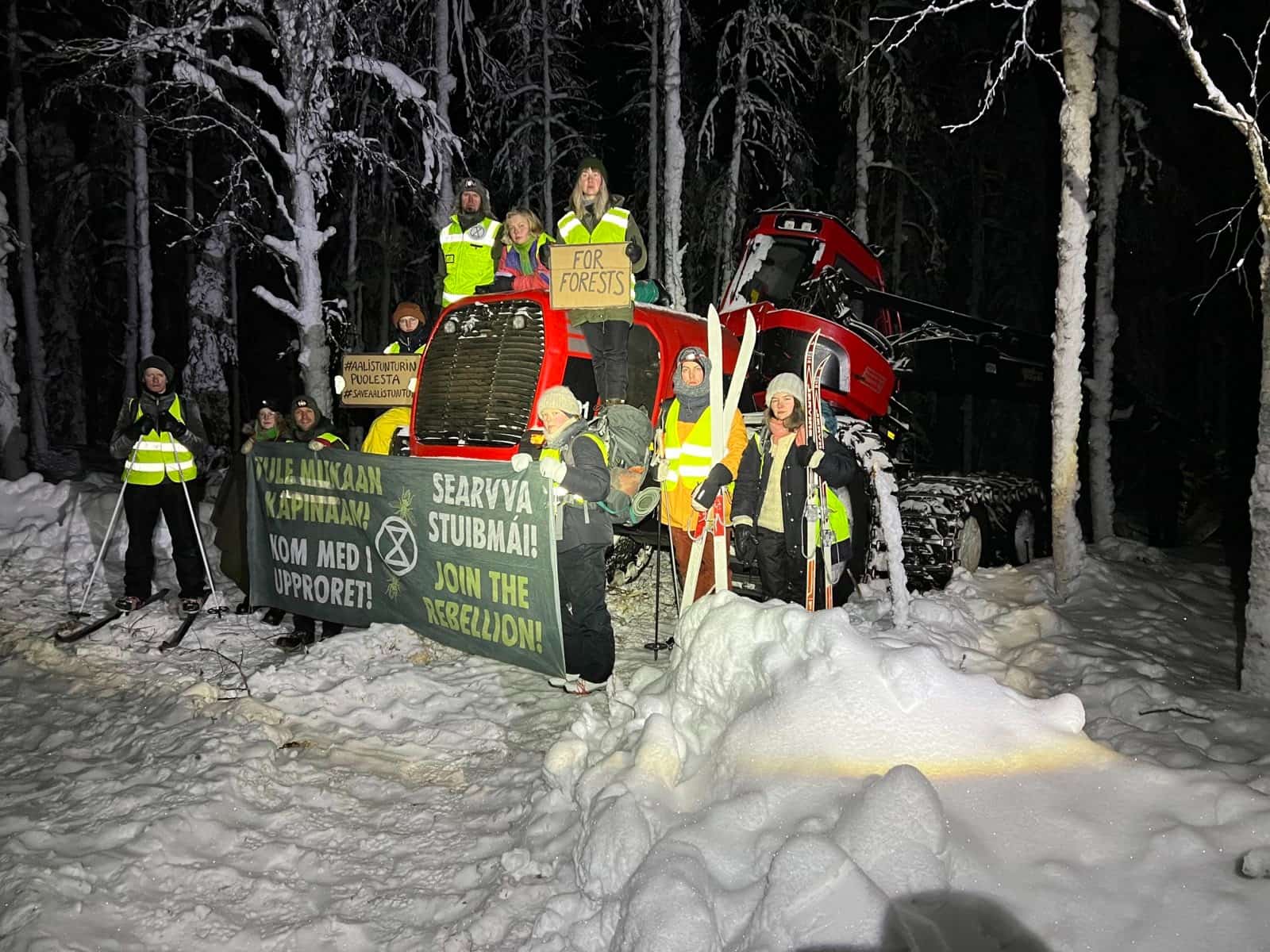
The Forest Movement roadblock campaign begins in the dead of night.
After trekking on skis through the remote wilderness of snow-coated Lapland, four Metsäliike (Forest Movement) activists set up camp among the trees. Eleven more activists from Elokapina (XR Finland), Greenpeace, and other organisations quickly joined them, and as night fell, the group started setting up roadblocks.
Their courageous campaign was an attempt to halt the logging of a 400-hectare expanse of old-growth forest. Although the area, Aalistunturi, is being considered for national park status by the Finnish government, the state-owned logging company Metsähallitus is busy trying to fell as many of its trees as possible.
The roadblocks worked: the company’s machines were grounded and logging was halted. Police arrived the next evening and arrested seven of the activists plus an innocent bystander, taking them to a nearby city, where they were held for 20 hours.

Forest Movement protesters keep up the roadblocks, and keep getting arrested.
Undeterred, the Metsäliike rebels returned to set up more forest roadblocks, only for the police to again detain them. This pattern played out for several weeks, with the rebels receiving evermore public support and media attention. According to one protester, Metsähallitus has threatened to sue them for lost profits.
The Finnish government has committed to protect 30% of its land to stop biodiversity loss by 2030. This aggressive state-sponsored logging of old-growth forests completely undermines these promises.
In 2021, Finland’s land use tipped from being a carbon sink to being a carbon emitter, in large part due to mass deforestation. Elokapina’s rebels are currently planning their next moves, with new actions being prepared across the country.
Follow Elokapina (XR Finland) on Twitter and Instagram
State Intimidation Boosts Dutch Blockade
26 - 28 JAN | The Hague, Netherlands
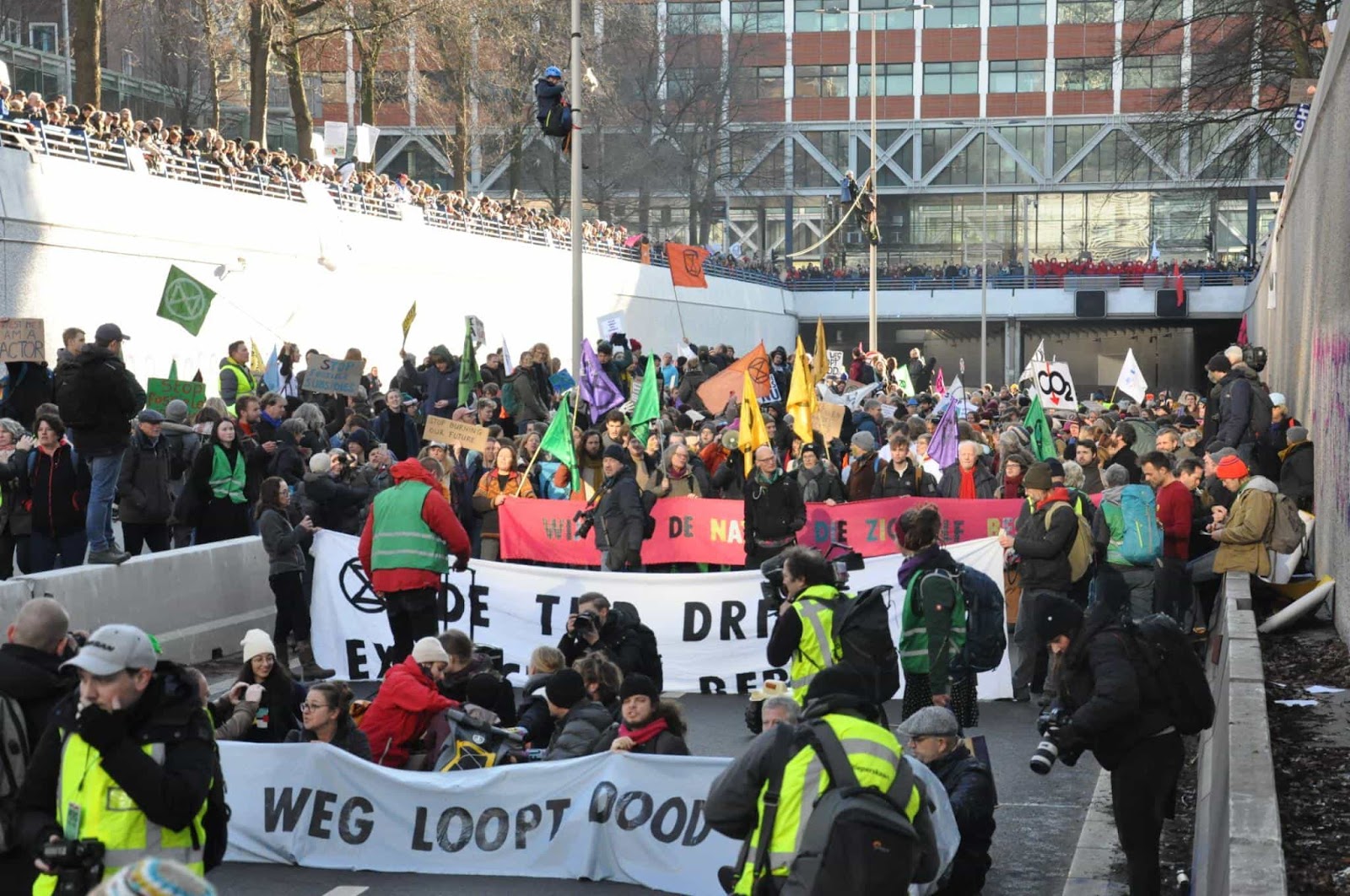
Rebels blockade the A12 highway and their new supporters look on from above.
Every year, the Dutch government spends €17.5 billion on fossil fuel subsidies (three times more than what it allocates for climate policy). The Netherlands will be largely underwater if global emissions continue on their current path, so last summer rebels started blockading the A12 highway, which passes the national parliament, to try and force their government to stop the suicidal subsidies.
Two days before its fifth and most recent A12 blockade, six rebels were arrested in their homes on suspicion of sedition or incitement. Without warning or explanation, they were taken to different police stations, had their phones confiscated, were held in custody for 10 hours, and banned from the A12 for three months.
If the state intended to scare the rebels and tarnish XR, it badly backfired. The arrests prompted an outpouring of support from the public, and condemnation from dozens of prominent NGOs like Greenpeace and Friends of the Earth.

Rebels show appreciation for the love and solidarity from the crowds above.
Even better, the solidarity carried over to the blockade itself. Thousands of people gathered in and around the A12, making it one of XR Netherlands’ largest ever blockades. While more than 1000 rebels sang songs and decorated the walls of the highway, an additional 2000 non-XR supporters stood in solidarity above them.
After half an hour, the police started to carry the rebels away. It took several hours to clear the road, and more than 700 arrests. All rebels were released the same day.
XR Netherlands has already announced it will keep coming back to the A12 until the government ends its fossil fuel subsidies. The next blockade is scheduled for March 11th and promises to be the biggest yet.
Want to be part of the next A12 blockade? Join this telegram chat to find out more.
Action Roundup
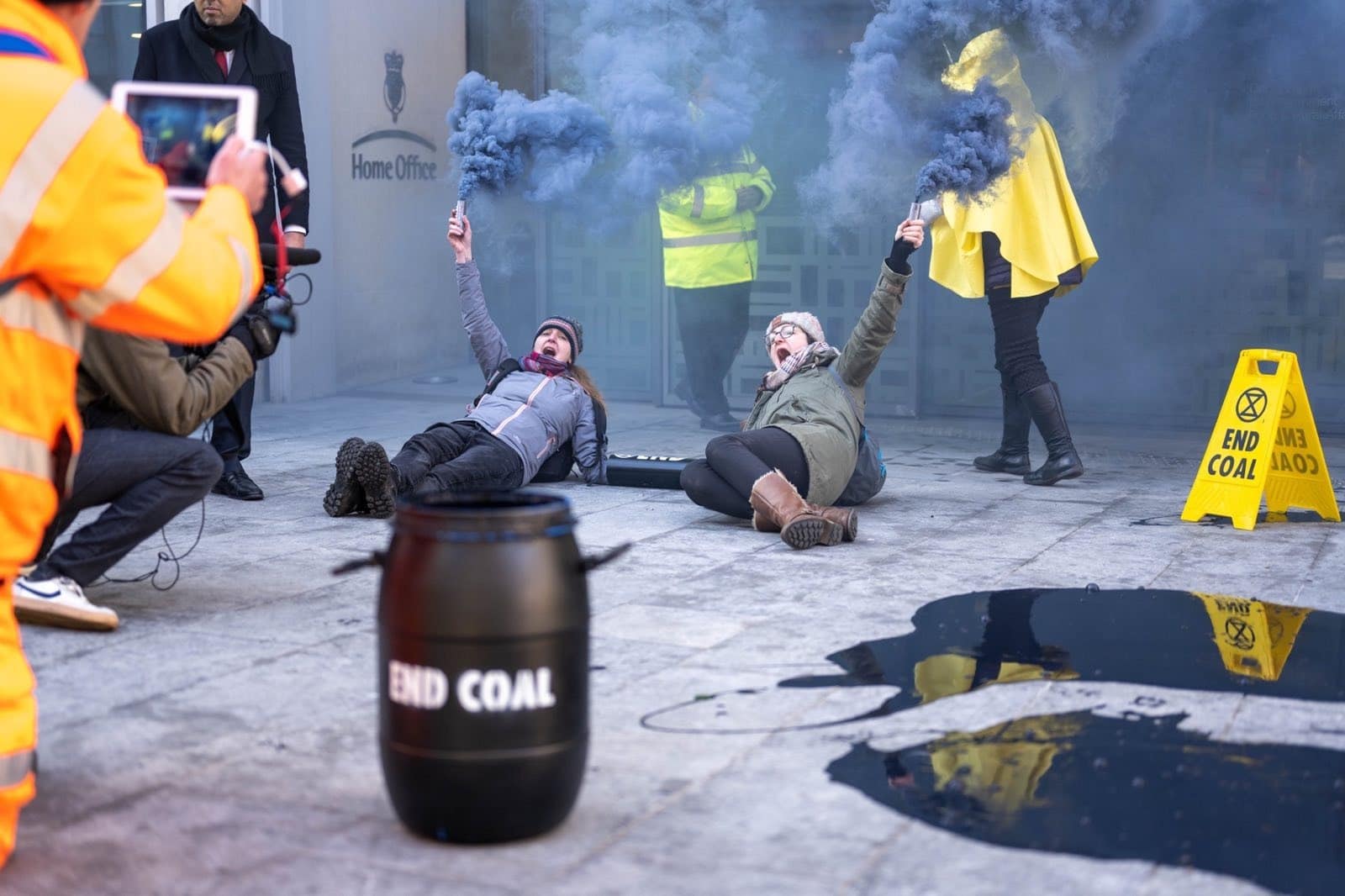
11 JAN | London, UK: Rebels pour black paint over the government department that green lit the construction of a new deep coal mine, the first in the UK for 30 years.
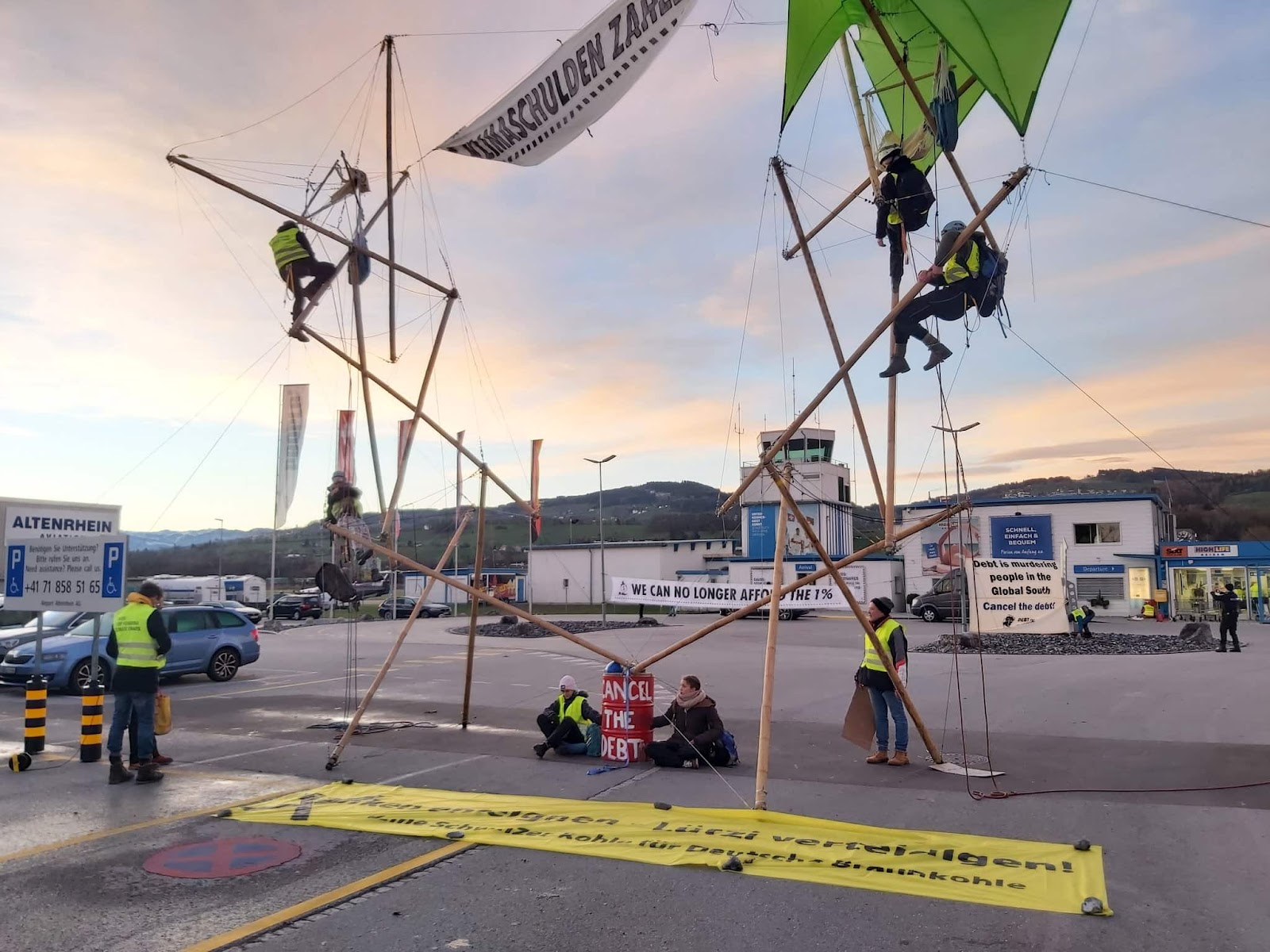
18 JAN | Davos, Switzerland: Debt 4 Climate activists block Davos delegates arriving in their private jets. Days earlier, they also confronted BlackRock’s Davos office to hold the giant investment fund accountable for their litany of financial and climate crimes.

20 JAN | Paris, France: 40 rebels and other activists blockade and repaint several buildings belonging to BNP Paribas. The French bank is the country’s worst fossil fuel investor, and a key financier of Total’s ecocidal African mega-pipeline EACOP.
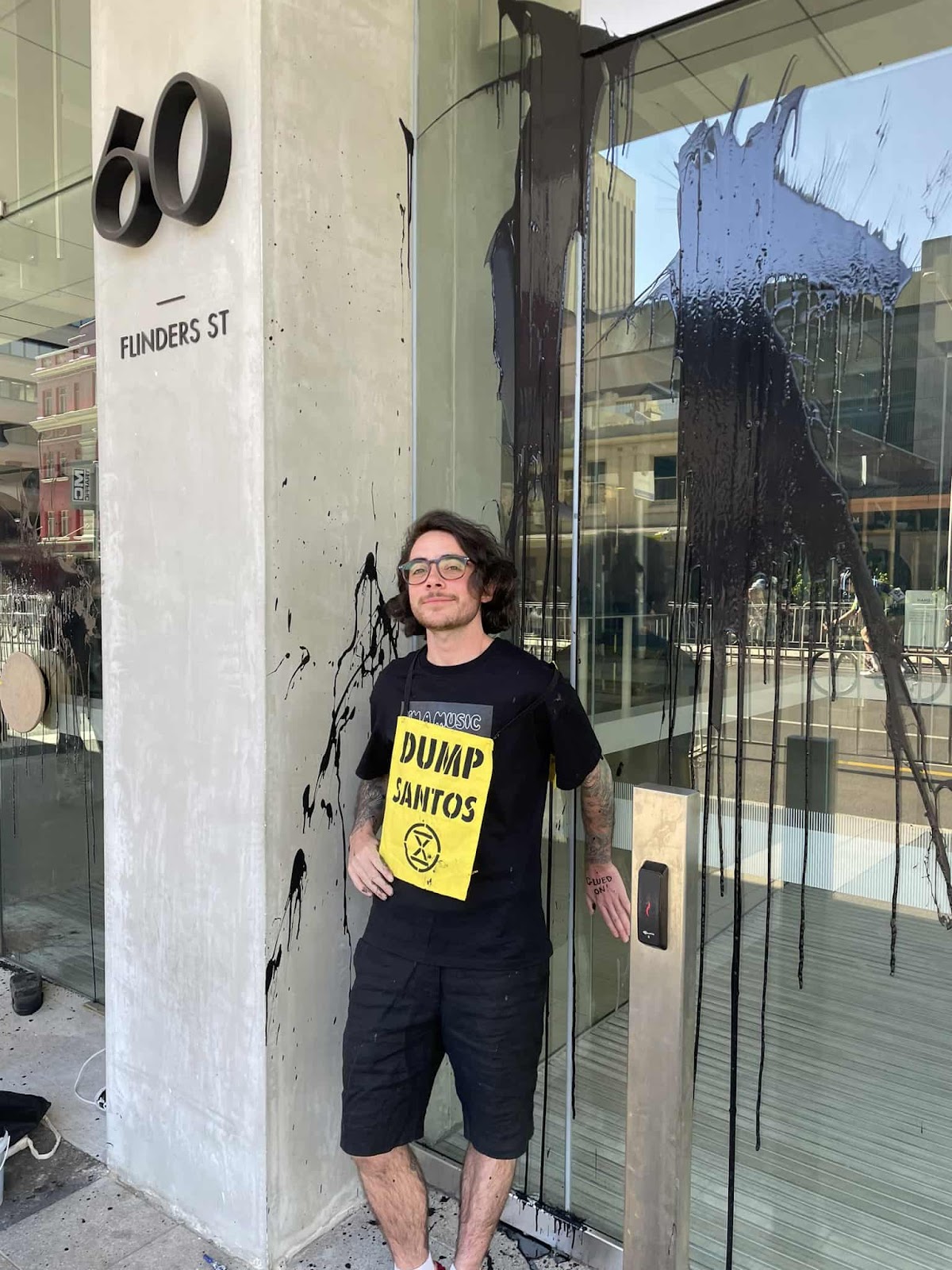
21 JAN | Adelaide, Australia: Rebels chuck paint at and glue themselves to the offices of Santos, the energy giant sponsoring a major cycling race in the city despite poisoning the region with oil spills. It also plans to raze local forests for gas wells.
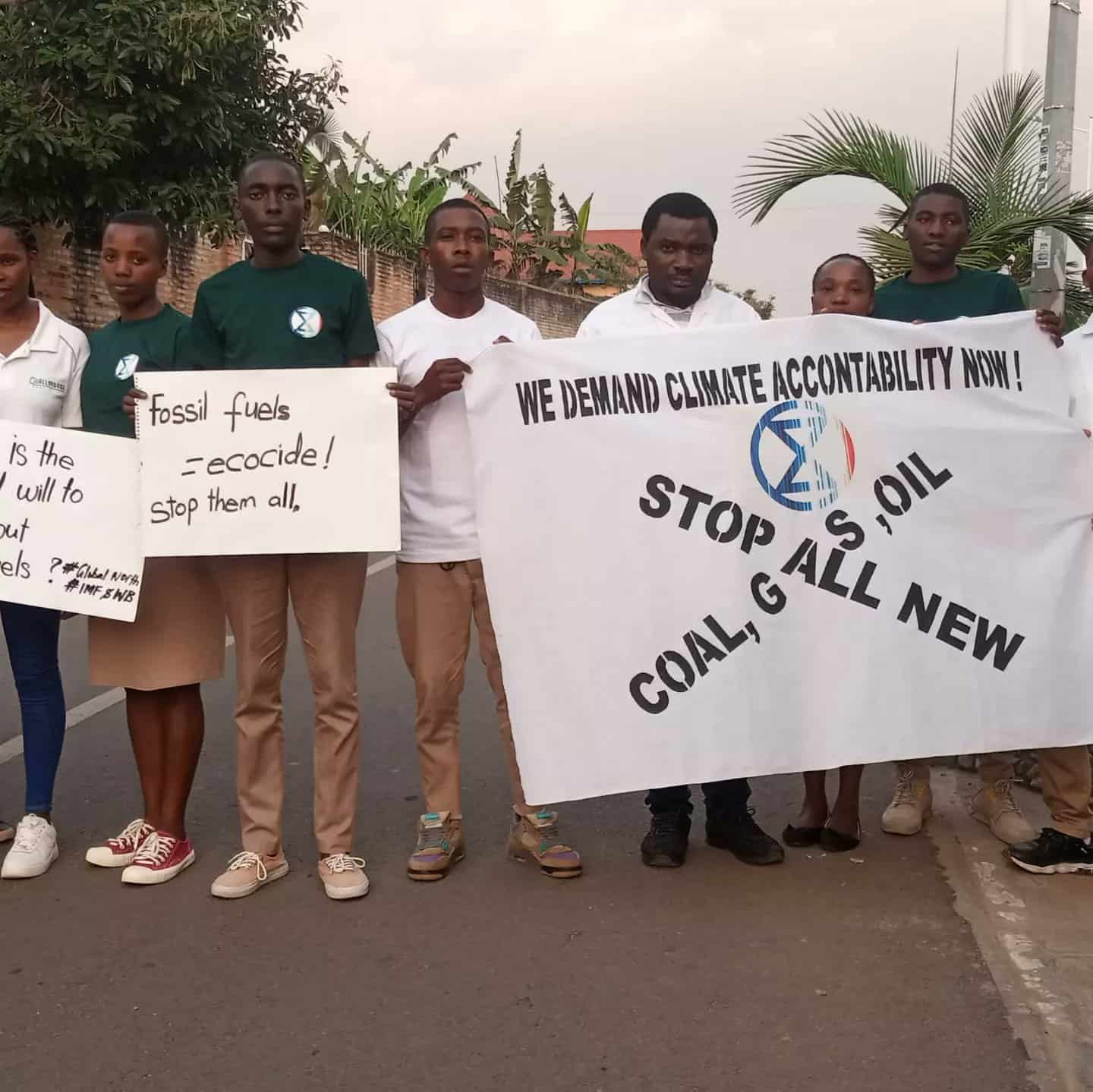
25 JAN | Muhanga, Rwanda: Activists with Scientist Rebellion hold a ‘Don't Gas Africa’ action in the city, demanding genuine decarbonisation from world leaders.
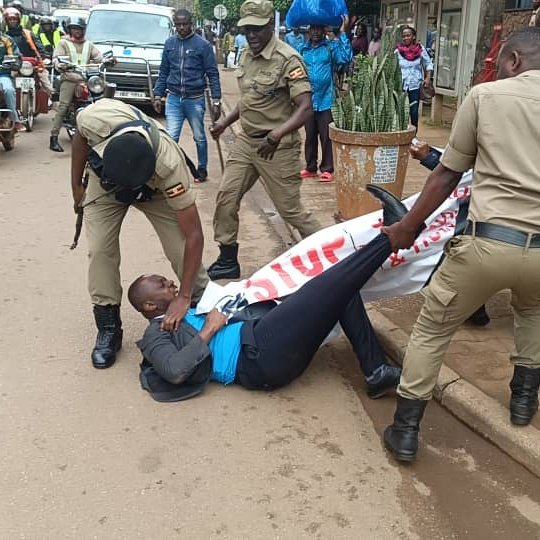
26 JAN | Kampala, Uganda: A Stop EACOP organiser is arrested while entering a public debate on the pipeline. Police surrounded the hotel where the event was to take place and blocked another key speaker from entering. The organiser was interrogated for hours, released days later, and must now report repeatedly to a police station.

1 FEB | Buenos Aires, Argentina: Rebels chain themselves to the gates of the President’s residence after he hires the ex-CEO of Syngenta as his chief advisor. The giant agribusiness company produces toxic pesticides like bee-killing neonicotinoids.
Special Report: Degrowth
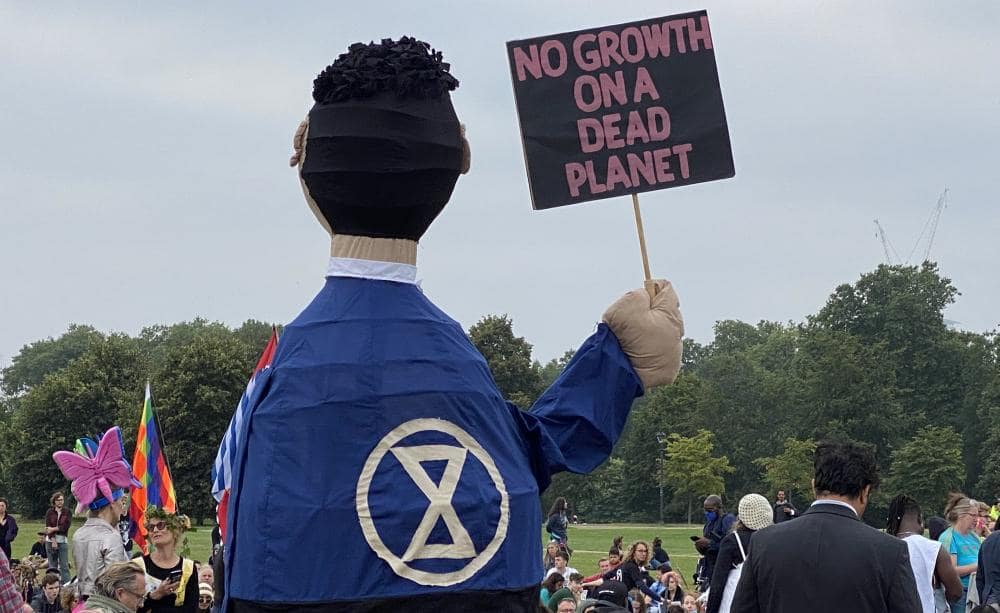
What is Degrowth?
Degrowth is a way to run our global economy that is sustainable and much fairer than our current system, capitalism.
As well as offering a tantalising glimpse of a world where we live within our means and ecosystems can thrive again, the degrowth movement illuminates how capitalism is the root cause of the climate and ecological crisis, and explains the maddening inertia of our politicians when it comes to solving it.
What’s so bad about Capitalism? Can’t we just tweak it?
No. Capitalism requires every corporation, every industry, every national economy to grow. This economic growth must be exponential and carry on forever. Without it, shareholders don’t get profits, investment dries up, people lose their jobs, and we enter a recession.
This is why nearly every government, whatever their political persuasion, champions economic growth. But this quest for constant growth has resulted in unfathomable pain and destruction across the 500 years that capitalism has evolved.
Economic growth requires that value be taken with minimal compensation (or better yet stolen) from elsewhere, and in the real world that means seizing resource-rich lands and exploiting workers. The horrors of enclosure and artificial scarcity, of colonialism and transatlantic slavery, of corporate ecocide and greenwashing, can all be understood as serving capitalism’s growth imperative.
And so can the climate and ecological crisis. Under capitalism, our economies churn through ever more resources, require ever more energy to do it, and produce ever more waste. We overshot safe planetary boundaries for this plunder decades ago, mostly to satisfy mindless consumerism in the Global North.
If we stick with this system, not only will we extract our way to ecological collapse, we’ll also guarantee climate breakdown, because we cannot roll out renewable energy fast enough to quench our ever-increasing demand for energy. Instead, renewables will just keep being added to the energy mix, as is happening today.
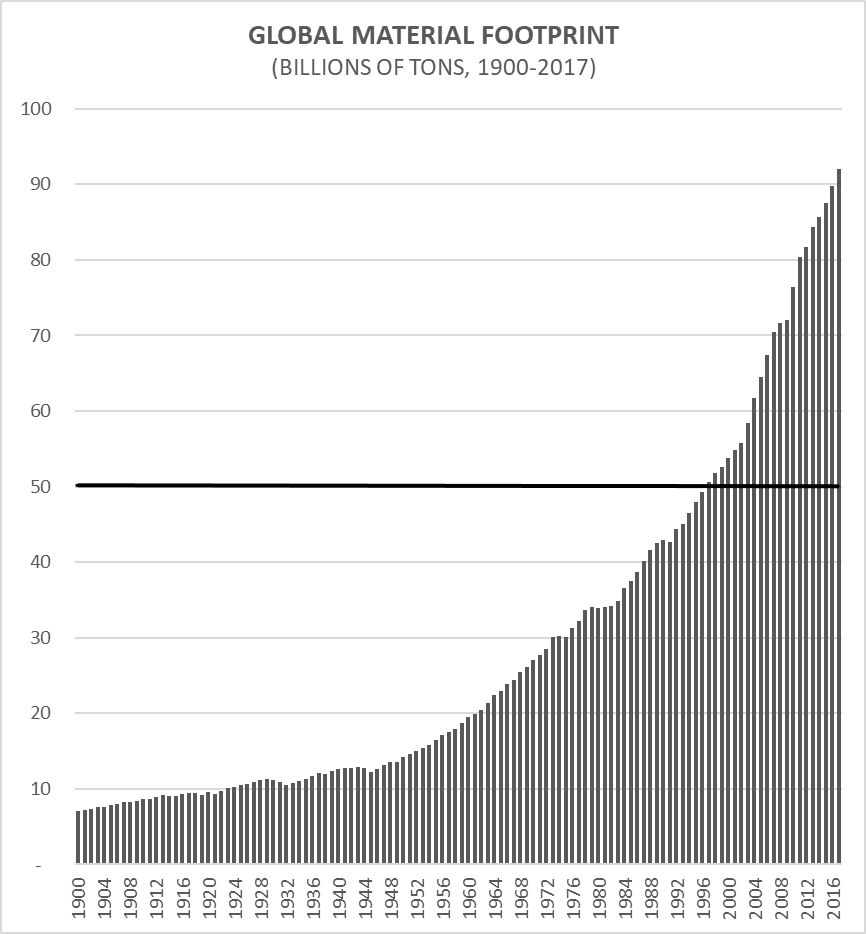
The material consumption of the global economy, all of it extracted from nature. The horizontal line represents the sustainable limit, which we rocketed past in 1999.
So what’s so great about Degrowth?
Degrowth doesn’t require the mindless pursuit of growth across all sectors. It allows for a planned reduction of energy and resource use to bring the economy back into balance with the living world, and does so in a way that reduces inequality and increases human well-being.
Degrowth allows us to choose what parts of the economy we want to grow (clean energy, public healthcare) and scale down those sectors we don’t actually need (fossil fuels, SUVs).
By only allocating resources and energy to what is needed, we can give ecosystems the breathing room to regenerate, and ensure that a just transition to renewables is possible. Our economy and civilisation will be in balance again with nature.
By distributing wealth more fairly and investing in public services, we can ensure that workers in scaled-down sectors can be provided meaningful jobs and regenerative skills without fear of becoming impoverished.
What about communities exploited by capitalism? Will they have to degrow?
The climate and ecological crisis has been primarily driven by the excessive consumption of rich people in the Global North. This is where degrowth needs to have its greatest impact, not in the Global South, where many countries still need to increase energy and resource use to enable good standards of living and health.
Much of the non-urbanised Global South is actually still tethered to low-carbon local economies that run in reciprocity with their ecosystems and well within sustainable resource and energy boundaries. The majority of our world does not need to degrow.
Learn more about degrowth by checking out our special Degrowth Must Reads.
Degrowth Must-Reads
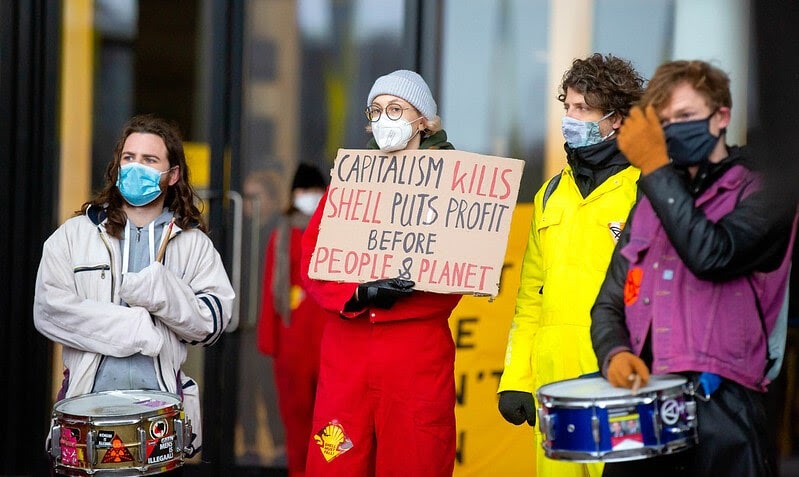
Now you know the basics about degrowth, it’s time to dig a little deeper. Below is one book, two podcasts, and a couple of videos to fuel your journey of degrowth discovery.
Less Is More: How Degrowth Will Save The World
If you’re going to read one book about degrowth, make it this one. In a clear and captivating way, author Jason Hickel exposes the damage wrought by capitalism, demonstrates its inability to resolve the climate and ecological crisis, and offers a blueprint for degrowth. It even has a foreword written by two prominent rebels.
Dissens Podcast: Jason Hickel (50 mins)
The Less Is More author outlines the central argument of his book - that it's either degrowth for the rich or climate disaster for everyone. If you’re unsure whether Less Is More is worth your time, listen to this interview and then go hunt down a copy.
Al Jazeera: Our Obsession With Economic Growth is Deadly (25 mins)
Journalist Ali Rae investigates how capitalism drives people in the Global North to overconsume, exploits people in the Global South, and devastates our planet. The answer? Rejecting the idea of infinite economic growth and embracing degrowth!
Digital Theme Week: Degrowth - South & North (1hr 26 mins)
Indian environmentalists Ashish Kothari and Shrishtee Bajpai discuss how Global South communities are resisting the capitalist system, promote a theory of radical eco-democracy, and position degrowth as just one of many complimentary solutions.
My Climate Journey: Degrowth with Timothée Parrique (1hr 8 mins)
In this podcast episode, the French researcher in ecological economics is quizzed about degrowth by a sceptic of the theory who wants to learn more.
Degrowthers of XR:
Ishan, India

Ishan (far left) with fellow rebels in Bangalore.
Growing up in urban India, I had little connection to the wild, though I did learn that plastic bags were bad at school, which led to quarrels with my mum. It wasn’t until I’d graduated and taken a sought-after role as a financial market's trader that my inner closet-environmentalist started to surface.
I yearned to know more about the world around me and started attending a local Greenpeace group, as well as research local issues like the burning lakes in Bangalore.
I finally quit the financial world after 2 years of “success” and moved to a place called Auroville, an off-grid eco-township built on deforested land in southern India. What started off as a small trip of self-discovery became an 11-month immersion into all-things local, low-emission, and sustainable.
I returned to the city and got my hands dirty working for a social enterprise in waste management. Spending long hours pushing big corporations towards zero-waste, I saw how doing the bare-minimum or worse, greenwashing, was the norm, and began to grasp just how vast and systemic ecological destruction really was.
Around this time I read about Extinction Rebellion, and was drawn to their use of creative disruption and mass mobilisations to highlight the climate crisis. I became part of a small group planting the first seeds of XR India, and within no time there were chapters in half a dozen Indian cities.
I was a co-initiator of XR Bangalore, and after a roadshow launch we held climate talks, helped arrange a climate-week bringing together diverse voices, and went on climate strikes with our local Fridays For Future allies.
It was a time of great activity, but also mounting eco-anxiety and fracturing personal relationships. At a national XR meeting in Goa, we decided to enter a period of pause and reflection to reshape our movement. The pandemic struck a month later.
Around the time XR Bangalore launched, I started reading about degrowth. With my background in finance, solving this crisis via an economics revolution made a lot of sense. It wasn’t just a valid critique of the system we were all part of, it also paved the way for the climate movement to fight for something, not just against something.
I joined a degrowth collective in Europe, and realised that while degrowth policy is absolutely necessary in the Global North, the movement still didn’t have a blueprint for how it might work in the Global South, where so many still haven’t experienced a quality standard of living.
For me, the key is not enforcing a homogenised or colonising economic model on everyone, but instead understanding the needs of diverse local communities, and using degrowth to transform hyper-globalised economies to ones that are mostly-localised.
When the Indian farmers’ protest turned violent two years ago, the government started rounding up young environmental activists, claiming they were agitators backed by foreign powers. Some of my rebel friends were detained and interrogated for weeks.
It was a shocking time, but also a galvanising one. We wrote articles, raised legal funds, and had important intergenerational conversations with other Indian activists about how to safeguard our communities from an overbearing state.
If you know (or are) a rebel somewhere in the world with a story to tell, get in touch at xr-newsletter@protonmail.com
Book of the Month
All We Can Save: Truth, Courage, and Solutions for the Climate Crisis, ed. by Ayana E. Johnson & Katharine K. Wilkinson
All We Can Save is a collection of essays and poems by climate feminists. The book has multiple stated missions. One objective is to provide a platform for people who are too often marginalised—women, especially women who are not white.
The editors also state explicitly that patriarchy is part of the cause of climate change, and so the book aims to use a feminist lens to deconstruct climate change at its root. Finally, the editors maintain that a distinctly feminine leadership style exists and is sorely needed in our current crisis.
Whether that last is true is debatable, but let’s leave that aside for now.
Most of the essays and poems do not mention feminism explicitly, though. They are mostly personal writings by women about their lives in this wounded world of ours.
Some directly offer advice on activism, communication, and related topics. Others indirectly offer advice, describing the author’s struggle with a given issue and the solution she found. Most offer a clear and honest look at a beautiful world in pain.
If you ever feel like nobody really cares for the planet as you do, this book is a reminder that you are not alone.
Avoid Amazon. Support local bookshops. Buy your books at Bookshop or Hive.
Upcoming Actions
The Big One: Sign Up Now!
21 APRIL | London, UK
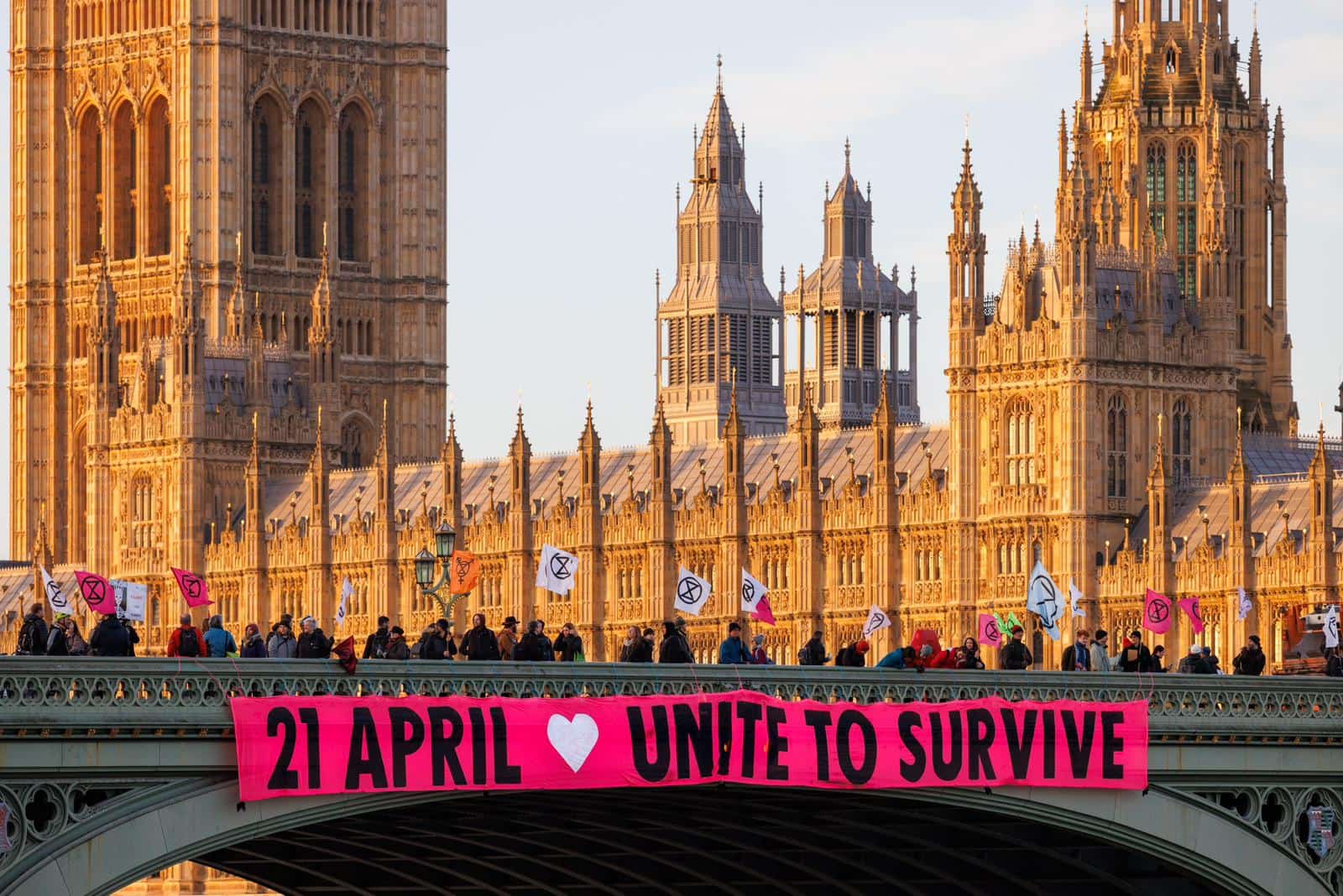
XR UK are reaching across and beyond the environmental movement to bring 100,000 people together around the Houses of Parliament in London on 21st April.
This is The Big One and to do it XR UK have launched a ‘100 Days’ campaign to mobilise support, raise funds, and engage new audiences.
Watch the launch video and tell us you’ll be coming along!
Debt For Climate: Global Call!
27 FEBRUARY | Global

Turn the tables on financial colonialism and hold the Global North accountable for their climate debt on a historic day for debt cancellation!
February 27th is the 70th anniversary of Nazi Germany's debt cancellation after World War II, which led to its "Economic Miracle".
Today, Germany is the 4th largest voting power in the IMF and the world’s 4th largest historic polluter. Germany, and the rest of the Global North, owe the Global South a massive climate debt, and we will take action globally on this day to make them pay it!
Get in touch! info@debtforclimate.org
Announcements
Burnout Prevention & Recovery Workshop
19 FEB | 17:00 - 18:15 EST | Zoom

This 75-minute online workshop will be led by a certified Ayurvedic Health Counsellor and combine Ayurvedic wisdom with the latest research to heal and prevent burnout.
Ayurveda is a holistic medical system that has evolved over thousands of years on the Indian subcontinent. Ayurvedic practices help us to balance our energy and reduce stress by living in harmony with the cycles of nature.
Register now to receive your video link.
Solarpunk Showcase 2023
5 MARCH Deadline

Do you ever think how much better our world could be? Good news! XR Wordsmiths has extended the deadline of its Solarpunk short story competition to March 5th!
The Solarpunk Showcase is an incredible exercise in radical imagination and creating new visions for the world we’re working to create. We need more positive visions to help us create a fairer, kinder, healthier world. If you’re new to Solarpunk, read some of our favourite entries from last year. If you’re familiar with it… start imagining!
For more information, visit our website or email: xr-writers@protonmail.com
XR Disabled Rebel Network: Help Us Create Zine!
Submissions close 31 MAY 2023

XR Disabled Rebels Network (DRN) is asking disabled rebels from all over the world to submit contributions for a zine (like a small pamphlet) that will raise awareness of the impact of the climate crisis on disabled people.
Email your submissions to xr.inclusion@protonmail.com
Contributions from D/deaf, disabled, neurodivergent people, as well as those living with chronic illness or long term health conditions are all welcome. Please state in your submission whether you want to be named, use a pseudonym, or remain anonymous.
Contributions can be in a variety of forms, including personal anecdotes/written pieces (word limit 1500 words), poetry, letters, photos, and all kinds of artworks. Submissions must be written in English, and all images must be JPEGs.
The deadline for submissions for the first edition is 31st of May 2023
Thank you

This protester was murdered by police for trying to save a forest near Atlanta, USA from being cleared to create ‘Cop City’ - a vast, militarised police training centre. Seven more activists camping in the forest have received bogus terrorism charges.
Thank you for reading, rebel. If you have any questions or feedback, we want to hear from you. Get in touch at xr-newsletter@protonmail.com.
The XR Global Newsletter is brought to you by XR Global Support, a worldwide network of rebels who help our movement grow. We need money to continue this crucial work.
